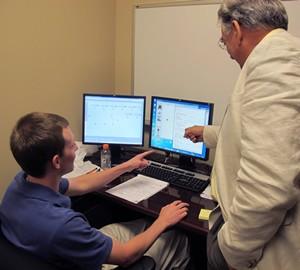In Jacob's room at US ITER
1 Jul 2011
-
Agatha Bardoel, US ITER
Nineteen-year-olds are not often found modelling and simulating a novel design for a cooling subsystem of the giant international tokamak reactor now under constructed in southern France.
But that is exactly what Jacob Clary, a rising sophomore in chemical engineering at Auburn University, is doing as a HERE (Higher Education Research Experiences) summer intern at US ITER. Jacob is working under the guidance of mentor Juan Ferrada, a chemical engineer and specialist in cooling water systems for US ITER.
Ferrada has been at Oak Ridge National Laboratory for more than 20 years, and has taught at the University of Tennessee and the University of Santiago in Chile. Jacob has been at his computer in a small US ITER office for just 5 weeks.
"I didn't realize. I don't know if you've ever seen a picture of everything that goes inside the tokamak ... I just can't understand how all that can ever get designed and completed," Jacob enthuses. "Because it seems like it is just the most complex thing ever. I can really see why it's taking years and years to figure all this stuff out."
"Just consider this little capacitor that I am working on," he continues. "The antennae generate heat that must be transferred to a mini water cooling system. It is a relatively simple little system that is going in there. And yet there is a ton of stuff that you have to know. All the temperature changes, all the pressure drops ... and you want to know the configuration of the system, all of that. And yet what I am working on is such a small part of it. It can fit on a little table top."
Jacob is working on something quite new. Mentor Ferrada explains: "Jacob is designing the cooling loop that will take that heat and dissipate it through a heat exchanger. The relevant information for him is that the capacitor produces 1 kW of heat and that he must design a system that can transfer that 1 kW to water that comes in at 28°C." Jacob is calculating and simulating that cooling system by using FLOW and FATHOM, software he had to learn when he arrived.
Jacob must design and simulate a pump big enough to perform the job, the pipes that the cooling water will flow through, and the kind of heat exchanger device that will transfer the heat. Afterwards, the water quality is maintained by a chemical and volume control system and then pumped back in.
"What I am doing right now, I don't really have a full understanding of it," Jacob says ruefully. "I just wish I had had a fluid dynamics class at Auburn in my first year. That is the only class I wish I had already taken. Everything else I can get along with here."
That "everything else" includes the software to help him calculate and design this mini cooling system for the capacitors. FATHOM gives the young intern all the pressure drops and flow rates he needs. FLOW, developed at ORNL, pulls together all the pieces needed for the design and then simulates the cooling process.
Mentoring students such as Jacob is a compelling part of Ferrada's life in science and engineering. In his career, he has mentored more than 100 young students. "You try to give them a project that will do two things: Teach them a little about the research, so they can take it back to school and talk to their peers about it. That is the first goal, to get the student immersed in our research," Ferrada notes. "The second object is to engage them, early in their careers, in a professional project, so they feel a sense of accomplishment. That is very important for their formation as a scientist or engineer."
How has Jacob's experience been at US ITER? "The spirit here is very good," he says. "It's not been like graveyard silence. The engineers have been really welcoming and they talk to me ... will have a serious conversation with me in the halls. Everyone is very good natured."
And as to a possible future career at ITER? "It's been interesting enough that I would definitely consider it," says Jacob.


